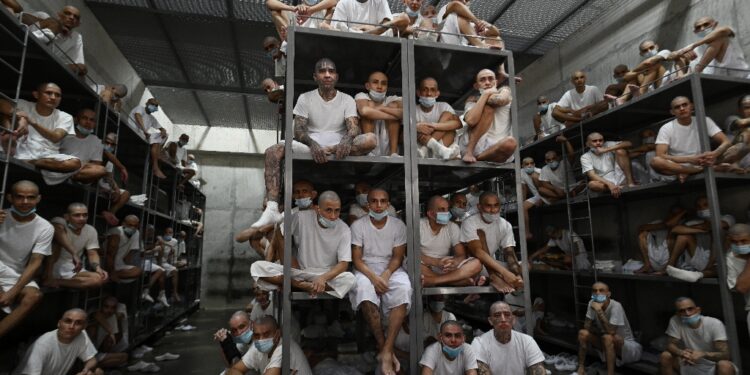(AFP) – Salvadorans are split over the offer from President Nayib Bukele to take in prisoners from the United States, with some fearing it could turn the country into another Guantanamo Bay while others say the proposal could reap dividends. El Salvador’s iron-fisted Bukele enjoys sky-high approval ratings for his sweeping crackdown on violent gangs, which has led to a sharp reduction in crime in what was once one of the world’s most violent countries. Over 80,000 Salvadorans have been arrested since he declared a state of emergency in 2022, thousands of whom are being held at a sprawling new Terrorism Confinement Center, Latin America’s biggest penitentiary, with capacity for 40,000 inmates.
On Monday, Bukele stunned Salvadorans and Americans alike by offering to incarcerate US convicts and deported prisoners alike at the maximum security prison on the edge of the jungle. Georgina Garcia, a 60-year-old stay-at-home mother, expressed alarm at the prospect. “Bukele is trying to clean the country of evil. How then could he then bring in more criminal people? He can’t!” she told AFP in a square in the capital San Salvador. Sixty-year-old former guerrilla Juan Jose Ordonez, who was running some errands nearby, also believed it would be “wrong” to accept prisoners from other countries. “We do not need him to bring more criminals into this country…we have enough social problems,” he said.
Ahead of US Secretary of State Marco Rubio’s visit this week, Washington had touted El Salvador as a possible “safe third country” for expelled migrants whose countries do not accept US deportation flights. Bukele offered to lock up convicts “of any nationality” at the facility known as CECOT, where prisoners live crammed in windowless cells, sleeping on metal beds with no mattress, forbidden from having visitors and kept under watch 24 hours a day. Rubio said the proposal, which was cheered by President Donald Trump even as he acknowledged questions over the legality of deporting US prisoners, covered members of El Salvador’s own MS-13 gang as well as the powerful Venezuelan gang Tren de Aragua.
Garcia said she feared that “Colombians, Haitians, Venezuelans” and other convicts would “corrupt this society even more, just as it is starting to straighten out.” But some Salvadorans said the country stood to gain from housing foreign convicts for a fee that Bukele said would be “relatively low for the US” but “significant” for his debt-ridden nation. Newspaper vendor Juan Ascencio, 67, mused that “if there is money” in it, the scheme could be worthwhile. Others saw potential dividends for around 230,000 Salvadorans whose protection from deportation was extended by Trump’s predecessor Joe Biden in his last days in office. The Trump administration has not yet touched the status of Salvadorans while stripping 300,000 Venezuelan migrants of the same protections.
Retired army sergeant Jose Alberto Claros, 65, suggested that Bukele strike a deal with Trump to halt all deportations of Salvadorans and to “legalize our fellow citizens” in the United States. But one of El Salvador’s main rights groups warned it would not stand by and watch the country become a “Guantanamo 2.0.” On Tuesday, the United States began flying detained migrants to the notorious military base in Cuba, where hundreds of terrorism suspects were held for years after the 9/11 attacks, many without formal charges. Ingrid Escobar, director of the rights group Socorro Juridico Humanitario, warned of a similar lack of due process for prisoners in El Salvador.
© 2024 AFP











